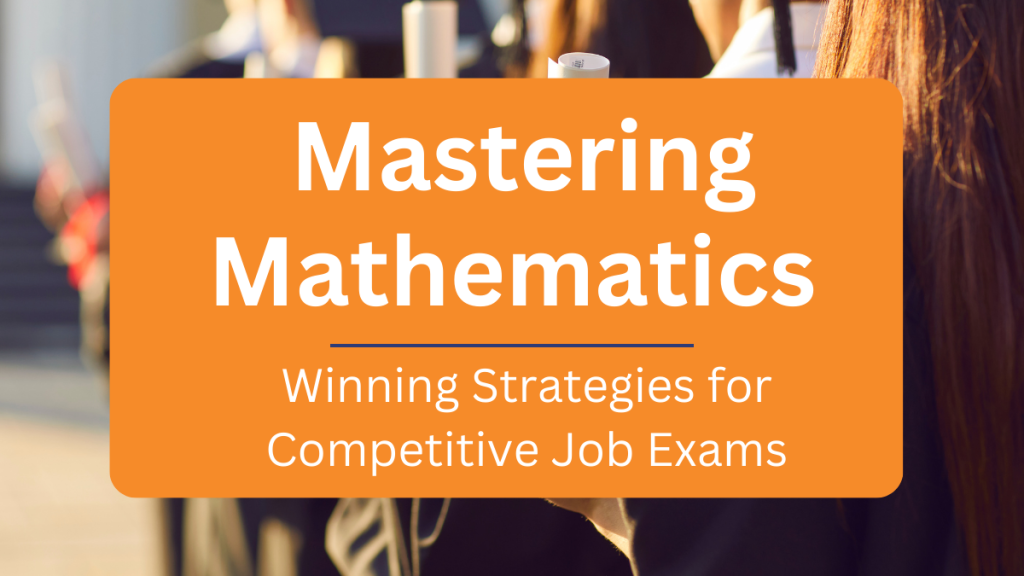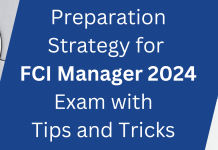Introduction:
Competitive exams for jobs in the banking, government services, engineering, and finance sector often include a section called Quantitative Aptitude or Numerical Ability to assess candidates’ logical problem-solving abilities in basic Mathematics. Mathematics is crucial in securing decisive marks in such competitive exams. To excel in this section, a strong understanding of quantitative concepts and a comprehensive preparation strategy coupled with regular practice are essential. You are in the right spot if you are gearing up for a competitive test. This write-up aims to provide a detailed guide on how to prepare effectively for mathematics in competitive exams, covering essential tips, study materials, and practice techniques. So, read on to score high…

Understand the Exam Syllabus:
The first step in preparing for any competitive exam is thoroughly understanding its syllabus. Carefully go through the exam pattern and syllabus to identify the topics covered in the mathematics section. Categorize the topics based on their weightage and difficulty level to plan your study approach accordingly.
The following topics are most commonly found in the Quantitative Aptitude section of almost all competitive exams-
- Number System
- Integers
- Average
- Square root
- BODMAS
- HCF and LCM
- Simplification and Approximation
- Percentage
- Decimals, Ratios, and Proportions
- Factors and Multiples
- Permutation and Combination
- Problems on Age
- Geometry
- Mensuration
- Profit and Loss
- Simple and Compound Interest
- Time and Work
- Time and Distance
- Trigonometry
- Mixture and Alligation
- Surds and Indices
- Boats and Streams
- Pipes and Cisterns
- Linear equations
- Data Interpretation
Gather Study Materials:
A. Textbooks: Select standard textbooks that cover the entire syllabus for the exam. Some popular mathematics books for competitive exams include Mathematics Solutions by R.D. Sharma, S.L. Loney for Trigonometry and Geometry, and Secondary School Mathematics by R.S. Aggarwal, among others. These books provide a solid foundation and numerous practice problems.
B. Online Resources: Utilize various online resources such as video lectures, online courses, and educational websites. Eminent faculties at ixamBee offer comprehensive study material and practice questions designed specifically for competitive exams.
Take a look at Online courses at ixamBee for different competitive exams
Create a Study Plan:
Organize your preparation by creating a study plan. Allocate time to cover each topic, focusing on your weaker areas. A well-structured study plan helps in staying disciplined and managing time effectively.
Focus on Conceptual Clarity:
Having a solid understanding of fundamental mathematical concepts is vital. Before moving on to advanced topics, ensure you have a solid grasp of basic arithmetic, algebra, geometry, trigonometry, and calculus. Seek help from teachers, tutors, or online platforms if you encounter difficulties understanding certain concepts.
Practice Regularly:
Practice is the key to excel in mathematics. Work on a wide variety of problems, ranging from simple to complex. Practice not only helps reinforce concepts but also enhances problem-solving skills and time management. Consider investing in a separate notebook for jotting down essential formulas and practicing questions. Solving the Previous Year Question bank will give you a thorough understanding of the question pattern in the particular exam.
Practice with Exhaustive collection of Previous Year Question Papers Papers at ixamBee
Utilize Mock Tests:
Take mock tests regularly to assess your progress and get a real exam-like experience. Mock tests help in evaluating your strengths and weaknesses and also familiarize you with the exam’s format and time constraints. Analyze your performance after each mock test to identify areas that require more attention.
Time Management:
In competitive exams, time management is crucial. Train yourself to solve problems quickly and efficiently. Learn shortcuts and tricks for calculations to save time during the exam. Regular practice and mock tests will help you improve your speed and accuracy.
Review and Revise:
Regularly review the topics you have covered and revise periodically. Revision helps reinforce your memory and ensures you remember important concepts. Create concise notes or flashcards to glance through before the exam.
Seek Help and Clarification:
If you face challenges or have doubts, do not hesitate to seek help from teachers, mentors, or fellow aspirants. Joining study groups or online forums can also be beneficial as you can discuss concepts, share strategies, and learn from each other’s experiences.
Stay Calm and Confident:
Finally, stay calm and confident on the day of the exam. Avoid last-minute cramming, as it may lead to confusion. Trust your preparation and believe in your abilities. Positive thinking will help you perform at your best.
Tips to Enhance Your Speed in Solving Questions
These techniques are especially useful in competitive exams, where time is a constraint. Here are some popular shortcut techniques for different areas of mathematics:
Mastering Formulas for Mental Calculation Techniques:
Squaring: For squaring two-digit numbers ending in 5, multiply the first digit by its successor and put 25 at the end. Example: 25^2 = (2 * 3) || 25 = 625.
Multiplying by Powers of 10: To multiply a number by 10, 100, 1000, etc., simply move the decimal point to the right by the number of zeroes.
Quick Addition and Subtraction: Use techniques like “complement method” or “rounding” to simplify addition and subtraction calculations.
Multiplication Techniques:
Multiplying by 11: To multiply a two-digit number by 11, add the digits and place the sum between the original digits. Example: 52 * 11 = 572.
Multiplying by 5: To multiply a number by 5, divide it by two and add a zero at the end. Example: 34 * 5 = 170.
Division Techniques:
Dividing by 5: To divide a number by 5, multiply it by two and move the decimal point one place to the left. Example: 150 ÷ 5 = 150 * 2 = 300 (move the decimal) = 30.
Dividing by 9: Various methods like the “finger method” or “casting out nines” to quickly divide numbers by 9.
Percentages and Fractions:
Percentage Calculations: To find 10% of a number, divide it by 10. For other percentages, adjust accordingly. For example, 20% of 80 = 80 ÷ 10 * 2 = 16.
Fraction to Decimal Conversion: Convert fractions to decimals using simple mental division. Example: 3/4 = 0.75.
Geometry:
Special Triangles: Know the properties of special triangles like the 30-60-90 and 45-45-90 triangles to find side lengths in geometric problems quickly.
Data Interpretation and Graphs:
Approximation: In data interpretation problems, use approximation techniques to get quick and close answers.
Reading Graphs: Learn to read and interpret graphs quickly to extract information efficiently.
Trigonometry:
Learning significant trigonometric formulas and Pythagorean Triplets will aid you in solving calculations swiftly, saving valuable time during the exam.
Trigonometric Ratios: Memorize the values of common trigonometric ratios like sin, cos, and tan for critical angles like 0°, 30°, 45°, 60°, and 90°.
Ensure you memorize:
Tables up to 25, prime numbers up to 200, squares up to 30, and cubes up to 20. Also, learning percentage-related fractions up to 1/20 will undoubtedly be beneficial.
Conclusion:
Preparing for mathematics in competitive exams for job opportunities demands dedication, consistency, and thoroughness. Understanding the syllabus, gathering appropriate study materials, practicing regularly, and honing time management skills can increase your chances of success in these exams. Remember, a well-rounded preparation approach that combines conceptual understanding with practical application is the key to achieving your desired results.
Shortcut techniques in mathematics are valuable tools that can help you solve problems more quickly and efficiently. But remember that while shortcut techniques can be very helpful, they should be used judiciously and with a strong understanding of the underlying concepts. Regular practice and familiarity with these shortcuts will enable you to apply them effectively in various mathematical problems and enhance your problem-solving skills.
Implementing these strategies can significantly improve your speed and efficiency, giving you a competitive edge in the exam. Wishing you All the Best!
FAQs
1. What kinds of questions are common in Quantitative aptitude tests?
A. The quantitative aptitude section is included in almost all major competitive exams to check the numerical ability of the candidates. Questions in word problems, graphs or data interpretation are asked.
2. Which competitive exams for government jobs have a Quantitative Aptitude section?
A. SSC Exams, Railway Recruitment Board Exams, Bank Exams, Insurance Exams, and FCI/FSSAI Manager Exam are some of the Government exams that incorporate the quantitative aptitude section. Moreover, the Quantitative Aptitude/Numerical Ability section is a crucial part of major competitive exams held nationwide, including CAT.
3. How can I easily crack Quantitative Aptitude/Numerical Ability questions?
A. Understand that solving Quantitative Aptitude/Numerical Ability questions is not an easy task. But practicing consistently and preparing smartly will definitely help you crack the hard part.
Engage in mock tests and question papers tailored to this section at ixamBee.
4. Are the Quantitative Aptitude/Numerical Ability questions very tough?
A. The quantitative aptitude section is mostly tricky, more than being tough. That’s why candidates feel the questions are challenging and time-consuming. So to excel in this section, candidates should concentrate on applying shortcuts and tricks that are based on their understanding of fundamental concepts. By doing so, they can enhance their speed and achieve higher scores in the exam.
At ixamBee, you can find free Online Test Series, GK updates in the form of BeePedia, as well as latest updates for SBI PO, Bank Clerk, SSC, RBI, NABARD, and Other Government Jobs. If you want to ace your banking exam preparation, it is important that you explore ixamBee’s Ultimate BeeBanker Online Course. This course is designed to help students prepare 50% faster for all bank exams.







![List of Highest Waterfalls in India [Updated] List of Waterfalls in India](https://ixambee.com/blog/wp-content/uploads/2021/05/blog-images-14-100x70.png)



